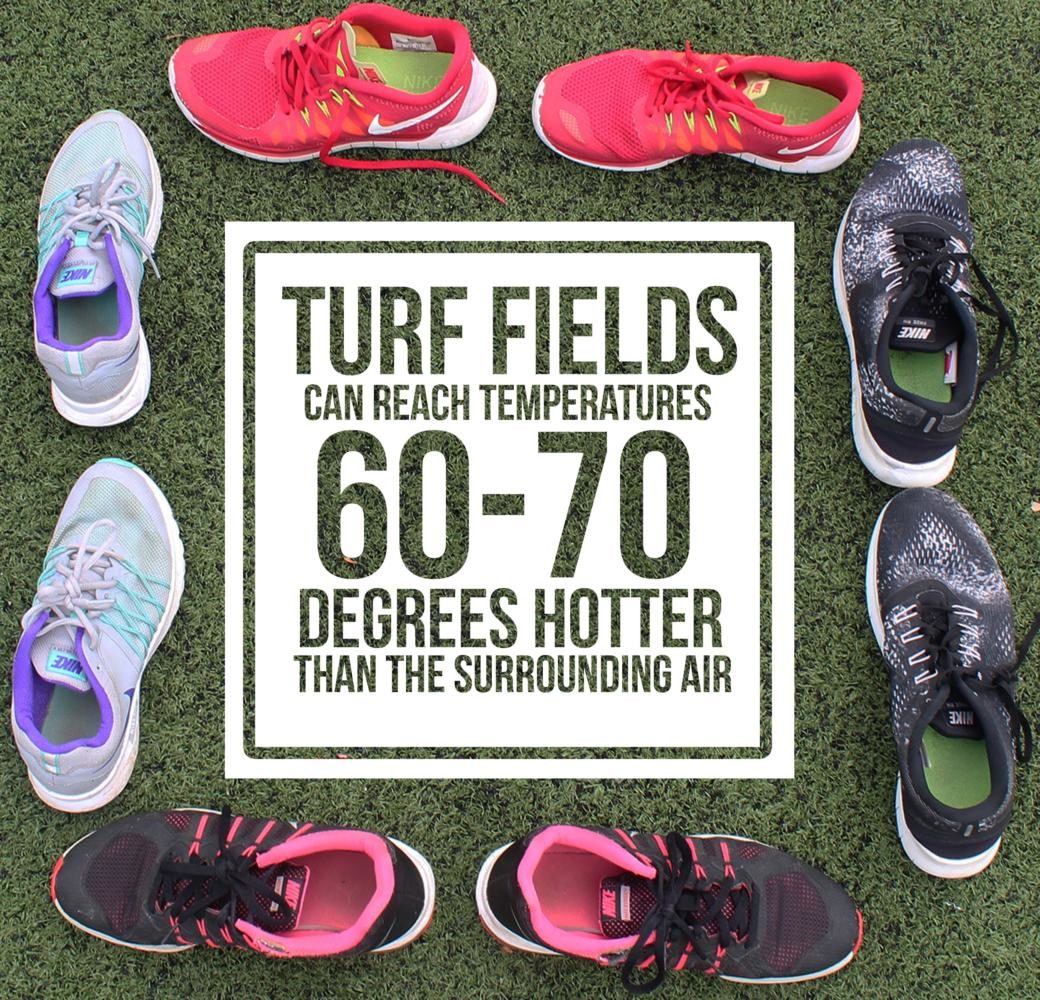Is Turf Making Us Sick?
Imagine a beautiful spring day as you play your favorite team sport. You run around the bright green turf field as the sun shines.
According to some research, hidden dangers may lurk within these seemingly harmless strands of turf.
According to Environment and Human Health Incorporated, a group of ten independent researchers and doctors, turf contains 92 different chemicals, each potentially dangerous to a person’s health. Exposure to such chemicals may irritate the eyes, skin and lungs.
Turf is often used instead of grass due to its benefits in efficiency and strength. Since turf does not need to be mowed, cut, or watered, it is easier and cheaper to maintain than grass. A turf field is also more durable and does not deteriorate as quickly as a grass field.
During the hot summer seasons, the temperatures of turf fields rises considerably. Turf can get 60 or even 70 degrees hotter than the surrounding air, which can cause dehydration or in severe circumstances, a heat stroke.
Olivia Marshall is a seventh grade student at Bedford and soccer player who notices the extreme heat that turf gives off. “When I lie down on regular grass, it feels cold. Turf, however, gets really hot,” she described.
Amy Griffin, an assistant soccer coach for the University of Washington, has been studying and recording the number of cancer cases among soccer players and noticed an increase in recent months. In April 2016, Griffin found 220 athletes who had cancer and whom she thinks may have developed it as a result of playing on turf.
Of the athletes in her study, 61 percent were goalies, a position that involves repetitive contact with turf.
Olivia has also experienced this contact first hand. “I’m a goalie on my soccer team, and the black tire pieces will often give me rug burns, which hurt a lot,” she says.
In addition, the chemicals in turf have other potential effects. According to Environment and Human Health Incorporated, 20 of the 92 chemicals can be irritating to the skin, eyes and lungs.
Research is not conclusive, and other groups have different takes on the effects of the fields. According to a study performed by the Connecticut Department of Public Health, the chemicals within turf are not strong enough to cause any considerable damage to a person’s health.
The Syn Turf Organization suggests the following precautions:
You should try not to play on turf during extremely hot temperatures in order to prevent dehydration or a heat stroke and limit your exposure to unsafe fumes.
After being on turf, wash your hands thoroughly before eating or drinking and don’t touch your mouth, eyes, or nose before doing so.
If you get a cut or abrasion, clean it immediately to prevent chemical infections.
After you finish playing, brush your hair thoroughly to get out stuck turf pieces.
You may not know if there may still be pieces of turf stuck to your skin, so it is helpful to shower immediately after playing on turf fields to avoid a continued exposure to its dangerous chemicals.
With a better understanding of turf, the potential illnesses that some researchers are worried about may not pose as a problem in the future.




Carson Mitchell • Mar 6, 2018 at 12:19 pm
I did not know how dangerous it is to be on a turf field. This makes me think that even though turf means less money for ground repair that it might not be worth it.
Lucas Carpi • Mar 6, 2018 at 12:10 pm
I think that it’s really interesting the effects that turf has and I never realized that it could be harmful.
scarlett • Feb 15, 2018 at 10:52 am
Before reading this article i didn’t think that turf could possibly be dangerous, but this changed my mind.
Evelyn Chudowsky • Feb 15, 2018 at 9:58 am
I play soccer as well and I really dislike playing on turf. I play on it often in the spring season and it can be annoying because it gets in your shoes and hair.I did not know about the heath reasons of turf before reading this article. Now I can be more careful when I am playing on turf.
Dylan Casazza • Feb 15, 2018 at 9:51 am
This is really interesting. I play on turf a lot, and never realized how harmful it can be for our health. The paragraph talking about soccer especially interested me because of the statistics revolving playing on turf a lot.